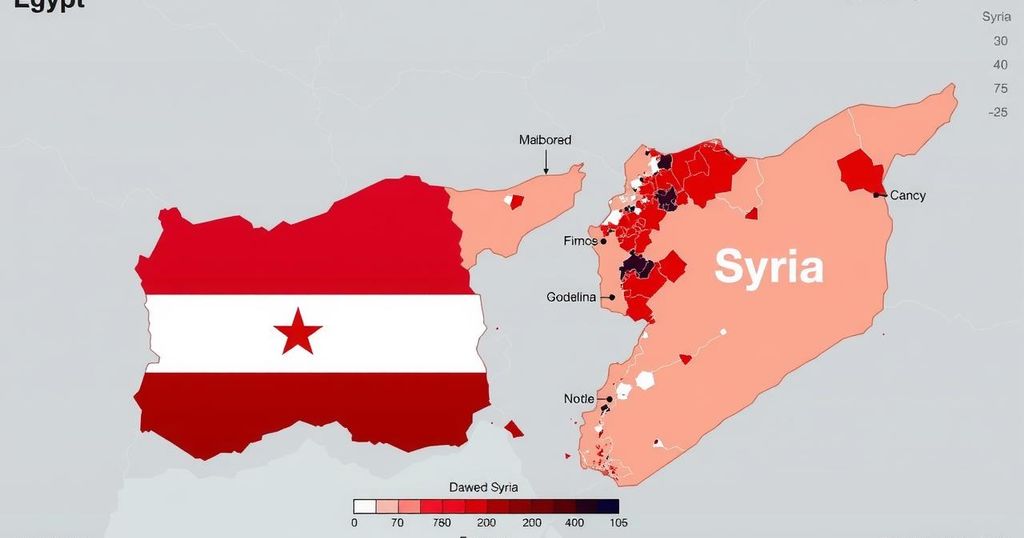When news broke of Bashar al-Assad’s regime coming to an end, the Syrian diaspora in Egypt celebrated joyously, yet faced immediate crackdowns by security forces. While the Syrian community comprises around 1.5 million individuals in Egypt, the broader populace observes with mixed sentiments of celebration and fear of political repercussions. The incident reflects the prevailing tensions between manifestations of solidarity and the restrictive political atmosphere in Egypt.
In December, the Syrian community in Cairo celebrated the reported end of Bashar al-Assad’s regime with spontaneous gatherings marked by joy and camaraderie among locals. Unfortunately, these festivities were swiftly interrupted by security forces leading to arrests and deportation orders for several attendees. Despite approximately 1.5 million Syrians residing in Egypt—who have largely integrated into society—fear of political repercussions stifled significant public displays of support for this pivotal change.
Among the jubilant voices were Syrian expatriates, such as Mohammed and Anas, reflecting on the unprecedented solidarity from their Egyptian friends. However, the atmosphere in Egypt remained cautious, with pervasive apprehension regarding the potential for political upheaval. Social media engaged in lively discussions over the prospect of a new era in Syria amidst persistent warnings from the Egyptian government about possible chaos and foreign interference.
Political experts highlighted the reaction patterns in Egypt, emphasizing the complex interplay of anti-Islamist sentiment and worries regarding the Muslim Brotherhood’s influence in the wake of Assad’s fall. This apprehension propelled government officials and allied media to champion narratives of stability amidst sweeping changes in neighboring Syria. Consequently, warnings of civil unrest originated from loyalist circles as Egyptian authorities unveiled stricter travel regulations for Syrians, aimed at averting any threats to national security.
The contrast in the political climates of Syria and Egypt led to diverse opinions among Egyptian nationalists and leftists regarding Assad’s regime. Some lamented the loss of a ruler they viewed as a stalwart against U.S. and Israeli interests, while others condemned the violent nature of his governance. This divergence underscores the intricate complexities of Egyptian nationalist sentiments, significantly influenced by contemporary sociopolitical landscapes and regional dynamics.
Political analysts predict that the recent changes may ignite introspection within the Egyptian opposition, especially regarding Islamist factions, as fears of a resurgence in political Islam loom large. However, many Egyptians appear disillusioned, lacking enthusiasm for demonstrations due to the prevailing climate of fear regarding state repression. This nuanced reaction reflects both the enduring impacts of authoritarian governance and a yearning for stability in the face of regional transformations.
The article discusses the implications of Bashar al-Assad’s fall from power on Egypt and its Syrian diaspora. It explores the response of the Syrian community in Egypt, highlighting the mixed emotions of joy and caution as well as the broader political atmosphere in Egypt that respects both the sentiments toward the Muslim Brotherhood and the government’s strategies to maintain control. The dynamics showcase the intersection of regional politics, socio-cultural issues, and the struggle for rights among displaced populations, illustrating how changes in Syria resonate beyond its borders into Egypt’s complex landscape.
In summary, the celebration of Bashar al-Assad’s fall elicits a mixture of euphoria and caution among Syrians and Egyptians alike. As the Syrian community in Egypt reveals a desire for change, the Egyptian government’s reaction underscores a fear of political dissent and instability. This complex scenario reveals deep-seated concerns over the resurgence of political Islam and the fragility of opposition movements, demonstrating how regional events intricately weave through local political narratives and societal sentiments.
Original Source: newlinesmag.com






